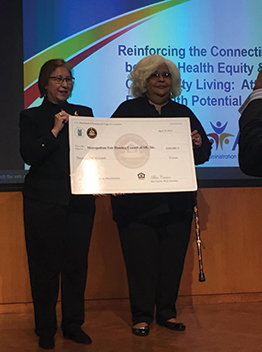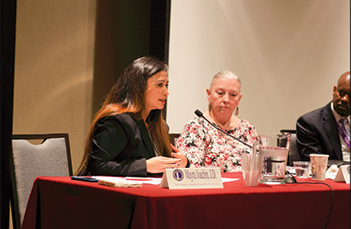
Oklahoma Coalition for Affordable Housing Supports 50th Anniversary of Fair Housing
The Oklahoma Coalition for Affordable Housing (OCAH) celebrated the 50th Anniversary of the Fair Housing Act this spring by sponsoring four trainings and seminars throughout the state. The coalition aimed to educate the community at large about federal housing laws and regulations that impact people’s health and wellbeing, and the accessible housing needs for people with disabilities.
In Oklahoma City, the coalition held the 2018 Oklahoma Fair Housing & Health Equity Seminar. This event covered fair housing laws, the enforcement of fair housing, the impact of housing discrimination, and behavioral health and housing. This seminar provided training to professionals from a variety of sectors including health, housing, and law.
Also held in Oklahoma City was the Commercial Real Estate Bus Tour, hosted by the Central Oklahoma Commercial Association of REALTORS®, OCAH Affiliate and Education Sponsor. The tour followed the proposed Bus Rapid Transit Route—a bus-based transit system that would have dedicated lanes for buses, stations in the center of the road, and off-board fare collections. The discussion on the tour focused on Americans with Disabilities Act (ADA) aspects of the proposed route and potential development of affordable housing near the route.
OCAH also promoted the Fair Housing Accessibility FIRST Policy Training in Tulsa. The free training was provided by the Tulsa Area Fair Housing Partnership & the U.S. Department of Housing and Urban Development. This training included information about the Fair Housing Act’s accessibility requirements, disability rights laws, and methods for making housing accessible through modifications and accommodations.
The last event celebrating the 50th anniversary of the Fair Housing Act took place in Tulsa and focused on landlord and tenant problems including housing discrimination claims and health and safety issues. All of these educational opportunities held during Fair Housing Month are just one way OCAH supports fair housing practices in Oklahoma.
Civil Rights Groups Challenge Policies that Restrict Access to Basic Utility Services
Many Americans are familiar with the protections the Fair Housing Act provides them when attempting to rent an apartment or purchase a home. However, many might not be aware that the law also protects them from discriminatory practices while living in their home or apartment. In LaGrange, Georgia, legal activists from a coalition of Civil Rights groups are relying on this aspect of the Fair Housing Act to challenge local laws they believe have a discriminatory impact on members of the community.
The City of LaGrange is the sole provider of basic utilities such as electricity and water and has imposed a policy that allows the city to restrict basic access to these services if the account holder has unpaid fines from any offense. The policy also allows LaGrange to restrict utility access if one does not have a Social Security card and a government ID.

In 2017, both policies were challenged in court by the Southern Center for Human Rights (SCHR), the National Immigration Law Center, and Relman, Dane, & Colfax PLLC on behalf of the NAACP. They argued that the policies had an unfair impact on the city’s black and Latino residents. While black residents account for fewer than half of the city’s population, 90 percent of individuals with unpaid court fines were black. Additionally, the policy targets Latino immigrants who are less likely to have the identification required. These residents are often forced to rely on a third party to gain access to basic utilities.
While the 2017 case was ultimately dismissed by the U.S. District Court of Northern Georgia, SCHR filed an appeal with the eleventh circuit court this past June. Amicus briefs in support of SCHR’s case have been filed with the court from many organizations including the NAACP Legal and Education Defense Fund and the Southern Poverty Law Center.